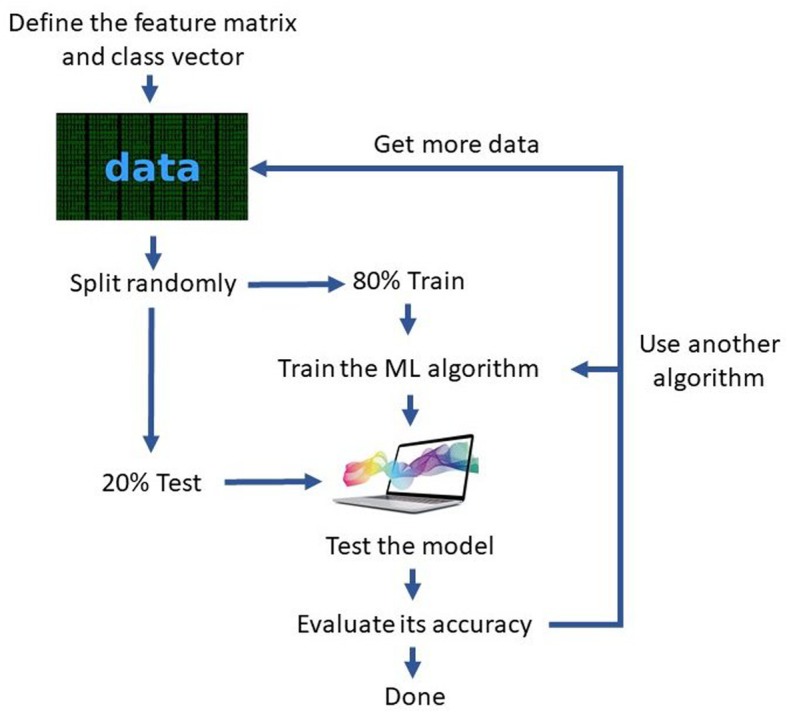CD Biosynsis is a leader in using artificial intelligence to advance enzyme engineering. With a professional team of scientists, we have long been dedicated to providing researchers with targeted enzyme evolution and design services. As artificial intelligence has been widely used in various fields in recent years, our EnzymoGeniusTM platform also applies artificial intelligence in the high-throughput enzyme screening process to accelerate the discovery of enzyme mutants.
Overview
For the development of AI modeling application projects, after completing the first step of data collection, it enters the more critical phase of AI model training. First of all, choosing the right algorithm is crucial for AI model training. We need to choose the appropriate learning algorithm based on the proposed target model and dataset, combining these two factors into a comprehensive consideration. For example, some common learning algorithms include decision tree algorithm, support vector machine algorithm, neural network algorithm and deep learning algorithm. After determining the model and algorithm, we can start training the AI model.AI model training usually takes a lot of time, and it depends on the size of the dataset and the complexity of the algorithm.
 Fig. 1 The process of creating a machine learning model. (Gutierrez G, 2020)
Fig. 1 The process of creating a machine learning model. (Gutierrez G, 2020)
Our Services
Our EnzymoGeniusTM platform is dedicated to the directed evolution and design of enzymes. Combined with our advantages in AI, we are able to provide our customers with AI model training of high-throughput enzyme mutant screening libraries.
We can provide the following types of AI training methods:
- Neural Network
Neural network algorithm is an extremely important class of machine learning algorithms and is also the basis of deep learning algorithms. Neural network algorithm is a model similar to the way brain neurons work, which is applicable to the fields of image, language processing, natural language processing, and it is one of the mainstream AI algorithms nowadays.
- Support Vector Machine
Support vector machine (SVM) is a binary classification model whose basic model is a linear classifier defined to maximize the interval on the feature space. The learning strategy of SVM is to maximize the interval and it is a supervised learning algorithm which is suitable for classification and regression problems.
- Decision Tree
Decision tree is a predictive model that represents a mapping relationship between object attributes and object values. Each node in the tree represents an object, while each forked path represents a possible attribute value, while each leaf node corresponds to the value of the object represented by the path from the root node to the leaf node. Decision tree methods have a wide range of applications in the fields of classification, prediction, and rule extraction for classification and regression problems.
- Random Forest
Random forest algorithm is an integrated learning algorithm based on decision trees. This algorithm improves the model accuracy by training many decision trees at the same time, which can improve the prediction performance and the diversity of problem solving for classification and regression problems.
Our Advantages
Professional Team: when choosing a machine learning algorithm, there are many factors need to be considered, such as data preprocessing, feature selection, model optimization and so on. For AI model development, we have experienced scientists to provide technical support to meet the attempts and adjustments in the training process of personalized AI models to get the best results.
Customized Services: We understand that each researcher has unique needs for AI-assisted enzyme variant screening model development. Our professional scientific team will work closely with you to understand your unique needs and accordingly provide personalized AI training algorithms to meet the AI model development services.
With a professional scientific team, CD Biosynsis has been dedicated to providing researchers with enzyme directed evolution and design services. Combined with the advantages of Artificial Intelligence, we use AI to guide enzyme variant discovery and screen for ideal enzyme variants. If you are interested in the exclusive customization service for enzymes, please do not hesitate to contact us.
Reference
- Gutierrez, G. Artificial Intelligence in the Intensive Care Unit. Crit Care. 2020, 24(1):101.

































 Fig. 1 The process of creating a machine learning model. (Gutierrez G, 2020)
Fig. 1 The process of creating a machine learning model. (Gutierrez G, 2020)